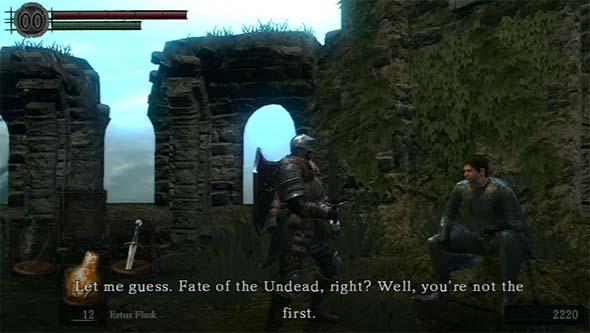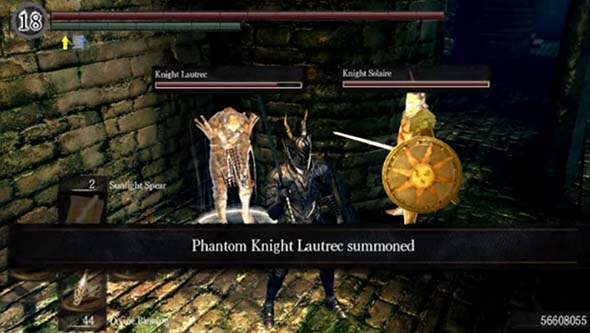
Even though the player character in Dark Souls can be in a "hollow" state, the player never truly goes hollow. At least, not in the sense that NPCs and enemies have gone hollow.
According to Dark Souls' mythology, the undead are condemned to repeatedly wander Lordran in search of a cure, being unable to permanently die. But for virtually all such undead, this quest is futile. An undead can temporarily stave off hallowing by absorbing souls or infusing themselves with the humanity of someone else. Eventually, an undead dies one too many times, or is worn down by the daily grind of collecting souls, and loses the will to go on -- or is simply unable to continue collecting souls and humanity. When this happens, that undead becomes hollow, loses his sanity and free will, and continues to wander the world as a mindless zombie attacking any un-hollowed that it encounters on sight.
It is unknown how many "Chosen Undead" are brought to Lordran or the Undead Asyulm, but the Crestfallen Warrior at Firelink tells us that many have come before you. Is it possible that all hollows in Lordran were at some point "Chosen Undead", tasked by Frampt to retrieve the Lordvessel and re-kindle the dying flame?
Probably not.
A great deal of the hollows that you encounter in the game were likely former residents of Lordran, and there was no need to select a "Chosen Undead" until Gwyn's power faded to a "cinder", and the fire began to die. This presumably took a very long time - a whole "age".

The Crestfallen Warrior informs us that we are not the first "chosen undead",
and suspects that we won't be the last either.
Avoiding hollowness with purpose
Many undead adventurers wandered into Lordran (or were abducted and taken there), and they struggle to hold onto their precious humanity for as long as possible, fighting for their lives in the fear that they, too will go hollow. Some, like the Crestfallen Warrior, resign themselves to the inevitability of hollowness, and find a sense of purpose in warning other new arrivals that they, too, are doomed. Others pursue some seemingly impossible goal or objective in the hopes that the journey will provide them with the sense of purpose necessary to avoid (or at least delay) hollowing. And yet others have taken up crafts or vocations such as blacksmithing, vending, or guarding something in order to keep them focused and avoid hollowing (and to exchange goods or services for the very souls that they need to stave off the hollowing). Keeping such a goal may help keep an undead partially lucid, but they also seem to begin to forget everything else, and only the knowledge of their quest or craft remains. Perhaps, the undead guarding various areas of the game were, at one point, tasked with protecting that place (or something within that place), but have long since lost their mind, and only that compulsion to defend has remained.
Going on "one final quest" seems to provide adventurers with enough focus to hold back hollowing.
But hollowing isn't just a thematic element reserved for non-player characters; hollowing is also a mechanic in the game that affects the player. Whenever the player character dies, you are reborn at the last bonfire in a hollowed state, unable to summon help from allies until you restore your humanity through the consumption of someone else's humanity. In Dark Souls II, hollowing further handicaps the player by cummulatively reducing your total health each time you die, and only restoring your humanity can refill your health meter. In both these cases, the player is not truly hollow; you are only in a state of partial hollowing.
It's unclear whether non-player characters are able to die and restore their humanity, or if deaths contribute to an irreversible progression towards hollowness. There are, after all, apparently hollowed NPCs such as the undead merchant in the Undead Burg and blacksmith Lenigrast in Majula who are sane enough to have kept their shops open. The presence of NPC summon signs hints at the possibility that they, too, are capable of restoring their own humanity through the same mechanisms that you can, but the game itself justifies this with ambiguous appeals to "time distortion" and hypothetical parallel realities that obfuscates the matter - particularly where Solaire and Lautrec are concerned.

Summoned NPCs may recover humanity as you do, or they're from another time or dimension, or both.
Solaire's dialogue refers to "heroes centuries old phasing in and out.". Solaire may be using the words "world" and "time" interchangeably. This seems to be the game's justification for how summoning works: you may be literally summoning someone from a bygone era into your own time period. Anytime, you are summoned to someone else's world, you are also being transported to another time (past or future, depending on whether or not you finish the game). Solaire and Lautrec seem to somehow come from another time or dimension, but other characters definitely seem to exist within your world and time: Andre, the Crestfallen Warrior, Rhea and her companions, Big Hat Logan and his apprentice, and so on are all undead who have seen many other "Chosen Undead" come to Lordran seeking their destiny.
In any case, it's not until an undead "gives up" that the hollowing process becomes complete. What do we mean by "giving up"? For an NPC, it means that they gave up on life and went hollow, and the player typically ends up putting them down. For the player, it means that you stop playing the game. As long as you continue to play the game, then your character will continue to hold onto a sliver of humanity and maintain his or her sanity for a little while longer. When you put down your controller for the last time, you have condemned your character avatar to finally succumbing to hollowness, whether you recognize it or not...
[More]